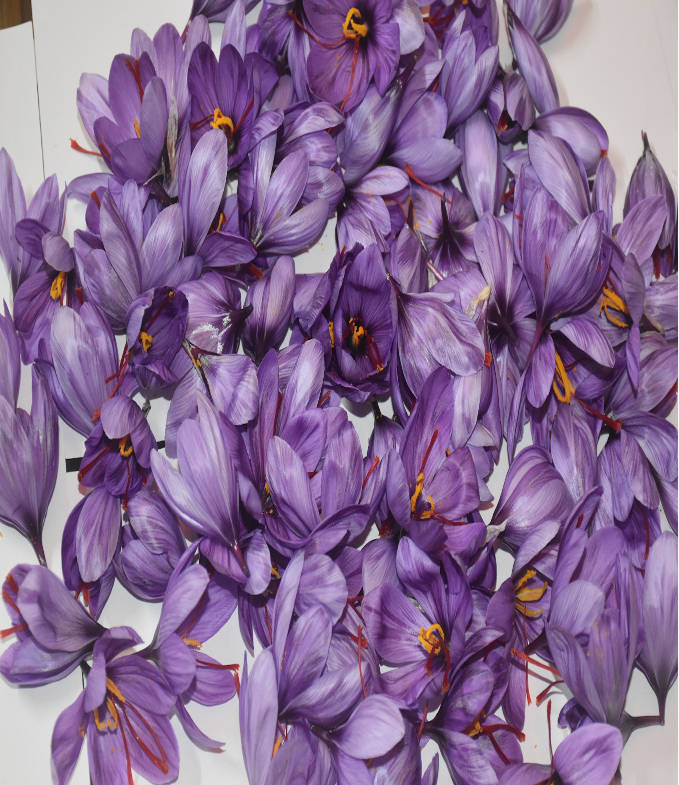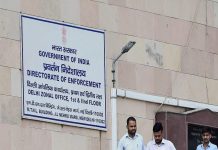By Dr.V.Kaul and Dr. Surender Sharma

The Institute of Horticulture Technology-IHT has successfully cultivated saffron in Shimla at village Bigri, Dhami with the support of Department of Biotechnology of Union Ministry of Science and Technology.
Saffron is an autumnal flowering geophyte- a plant propagated by means of vegetative propagation through corms and whose dried stigmas are well known for its aromatic, pharmaceutical and colouring power. It has been used as a spice in human nutrition from times immemorial.

Saffron is an autumnal flowering geophyte – a plant propagated by means of underground buds and whose dried stigmas are well known for their aromatic and colouring power, it has been used as a spice in human nutrition from times immemorial.
No doubt in India, Kashmir has the virtual monopoly of saffron as a valuable industrial/medicinal product and contributes a lot to its agricultural economy, however very recently the crop has been introduced in some other parts of the country viz., Himachal, Assam, and Uttarakhand.
For the first time despite facing challenges, an expert team of IHT showcased technological interventions for the cultivation of saffron in Bigri, Dhami., Himachal Pradesh using soilless media along with micro-irrigation (drip irrigation), standardized fertigation schedule, and other modern technological inputs. The area in Himachal Pradesh has a potential for bio entrepreneurship of the precious spice and is as important as Kashmir in the production of saffron.
Himachal Pradesh although having suitable areas and climate for saffron cultivation has not been successful in having a footprint as a major producer of saffron in India and is far behind Kashmir in saffron production. The adoption of modern technologies in soilless cultivation under protected conditions of saffron as demonstrated by IHT in Shimla, Himachal Pradesh is key to success for scaling up the production commercially and will reduce the cost of cultivation.
The adoption of modern technology like the soilless cultivation of saffron under protected conditions will foster the growth of production and productivity in a short period to meet the growing domestic demands. The essentiality and utilizing appropriate technology like soilless cultivation under protected conditions as demonstrated by IHT, Shimla, will result in the competitive edge in commercial production of saffron and simultaneously will meet the quality standards of the conscious consumers.
Saffron cultivation can have a drastic transformation as it has an evident advantage over traditional crops in generating rural employment, and enhancing rural income and has a high potential to tap national and international markets.
Institute of Horticulture Technology established during the year, 2009 under the aegis of Akhil Bhartiya Gramin Vikas Sanstha. The Institute is equipped with well-qualified and dedicated faculty, including need-based visiting experts and guest faculties from Israel, the Netherlands, and Thailand. IHT’s Technology Park has several polyhouses ranging from simple walk-in-tunnels to fully Hi-Tech greenhouses, integrated computerized fertigation systems, energy-efficient greenhouses, a hi-tech nursery raising chamber with boomer irrigation facility, besides an open cultivation area under various horticultural crops. It has undertaken several R&D projects in various states in partnership with other institutions and industries of national repute. Department of Biotechnology, Government of India has also supported IHT in Technology demonstration projects for the welfare of the farmers, especially for developing Bio entrepreneurs. One such project is being undertaken in Shimla, Himachal Pradesh on the soilless cultivation of Saffron.
It has designed several training courses of varying durations on various aspects of horticulture. IHT has provided training to more than 68,000 trainees in all the Campuses/Centers in India. The trainees hailed from 23 states/union territories of India and abroad- Tunisia, Ethiopia, Ghana, Sudan, Tajikistan, Palestine, Vietnam, Tanzania, Sri Lanka, Kenya, Bahrain, Afghanistan, Bangladesh etc.
Dr. V. Kaul is Associate Director and Dr. Surender is a Scientist with the Institute of Horticulture Technology











